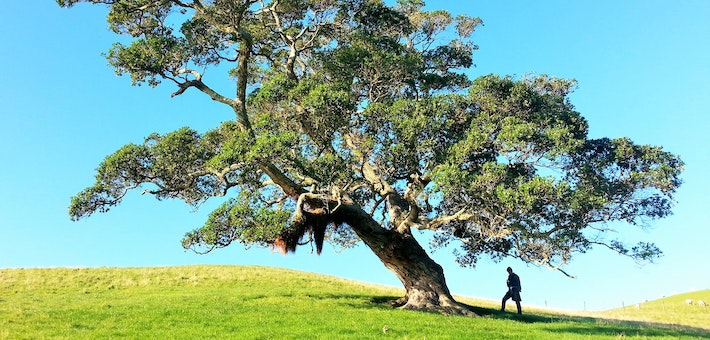Commentary on Mark 4:26-34
The seed parables of Mark 4:26-34 are mysterious.
Yet these parables have an equally tricky referent: the Kingdom of God. This makes life tough for preachers. Ideally a parable puts two things side by side (say, seeds and the Kingdom of God) so one clear thing helps to explain the other unclear thing. But what if the Kingdom of God (a mystery if there ever was one) is likened to various seed parables that themselves feel largely opaque? At first glance, Mark’s seedy parables may seem unlikely to help illuminate an equally elusive Kingdom of God.
Fortunately, our general cultural imaginations about sowers and seeds help us out a bit. Parables of sowers and seeds may seem quaint, but in the history of art these very images were much beloved. Van Gogh’s “The Sower” is mysterious, but somehow also luminous. There is something mysterious haunting the ordinary in Van Gogh’s famous work of art about the sower and seeds. Yet even Van Gogh’s painting doesn’t compare to the tensive, imaginative disclosure we once likely learned in elementary school. Do you remember that? You’d place a bean seed in a little paper cup filled with soil, wait a few days, and watch. The mysterious quality of that paper cup seed is exactly what helped give the seed imagistic life in the ancient world: it’s a discontinuous miracle. You put a seed in the dark ground and, poof, like magic it turns into something else: something green, thriving, perhaps even spreading across the ground.
This discontinuous, mysterious nature of the seed is part of what Mark wants to get at with his parabolic comparison with the Kingdom of God. A seed once planted is a mystery being revealed. It unfolds by its own operation in the soil. Planters may sleep and rise, but a seed’s work is automatic, as the Greek word in Mark 4:28 suggests. What’s apocalyptic about seed growth? For Mark, it is its likeness to cosmic timetables. As New Testament scholar Joel Marcus points out, the automatic sequence of a seed first sprouting, showing a head, and then yielding seed became a commonplace of apocalyptic literature for how divine transformation happens.1 The emergence of the seed in its sequenced growth is like the Kingdom of God in this sense: it grows mysteriously of its own accord and appears on God’s timetable (not yours or mine). God’s divine reign is apocalyptic and automatic and on a divine timetable, like the growth of a seed.
But in Mark 4, the seed metaphors just keep on coming. The mustard seed parable in verses 30-32 seeks to explicate the apocalyptic mystery in one further sense: the seed’s growth also appears and spreads “all of a sudden.” Mustard seeds have the beautiful quality of being small but with the ability to spread and take over a field—in Mark’s text, sprawling enough to include shade for all those gentile birds of heaven, too! Along the way, the eccentric comparison to a mustard plant provides a little prophetic edginess; few powerful nations liked to compare themselves to mustard bushes, but rather to impressive, great cedar trees. The mustard seed decolonizes by comparison to mighty cedars. The mustard plant is short, scruffy, and small; but it is also in Mark’s sanctified imagination sprawling and sufficient for shade—just like this mysterious Kingdom of God.
This is where Mark’s mysterious seed text meets us, and its vision of growth even more so if we are optimistic moderns. We may not be apocalyptic people, but we will gladly tag along for a little harvest joy with our seed. The image gives us hope in the seed’s own automatic trajectory of growth. People like Theodore Parker, Martin Luther King Jr., and even Barack Obama might well agree, even if their words and images differ: “The arc of the moral universe is long, but it bends toward justice.” Whatever the Kingdom of God is, it is indeed like a seed that grounds our hope that eventually things can change. The moral universe has a bending arc to point you toward it. That kind of hope can get you through a difficult patch. And so even Jesus’ seedy kingdom sounds good enough to people like us.
But what seems strange in Mark’s world is that their crushing imperial context itself would preclude any kind of automatic hope. Most scholars agree Mark was written close to the destruction of the Temple in 70 CE. The conflicts and dangers of the 70 CE world in which Mark was written reflects a context of public chaos which untethered traditional identities for Jesus followers, Pharisees, scribes, and crowds alike. In such an imperial context, the seed as a parable for the Kingdom of God seems oddly detached from reality and the persons suffering the chaos. How did Sarah Palin put it during the Tea Party heyday: “How’s that hopey changey stuff working out?”2 A seed like Mark’s seems nice enough, but may not be much good in the midst of Jerusalem’s ruins and social chaos.
But that may be one place where we ourselves might agree with Mark’s world. Our present context poses the same questions for seedy eschatologies and Kingdom hope—especially the Markan mustard variety. As I wrote these words, the court testimony of the sidewalk bystanders in the George Floyd killing seemed empty of hope. In their cell phone videos, you too can see them: the EMT, the youth, the martial arts expert, and the convenience store cashier lined up pleading with the white policeman kneeling on a Black man’s neck to stop and render assistance to George Floyd. As you watched their own videos, it seemed even to the bystanders themselves that all they could do from the sidewalk was to cry out and plead, but effect nothing. One teenager on the sidewalk even testified in court how she apologizes over and over again to George Floyd at night. She asks herself whether she could have done more. And why did her pleading or their yelling not suffice? Her haunting words make Jesus’ mysterious parable hard to hear. What about Mark’s seedy hope of an automatic Kingdom of God can survive her tearful testimony?
And then came the verdict on April 20. As many said, while justice did not come that day, accountability did. How did the lead prosecutor put it?: the bystanders were a “bouquet of humanity.”3 The very people who cried out from the sidewalk and made videos with smartphones were a surprise flowering of what it means to be human. The bystanders did not save George Floyd’s life, but they were a mysterious, living, testifying, bouquet of humanity. And in a moment, something of our view of Mark’s seed parable changes. What it offers now is a glimpse of change, a germination that flowers right there on a cracked sidewalk at 38th and Chicago.
Now that is mysterious and even a little revealing. Even so, there is one thing I now lay hold of. There may well be an arc of the moral universe that bends toward justice, but that modern view is for us both a promise and a goal. The famous quote from Parker and King and Obama uses the intransitive verb, “bend.” But there is no one who says that we can’t lay hold of that arc and in the name of the promise bend it a little bit ourselves with a little transitive joy. For we, thanks to Mark, are people who even now glimpse germinating seeds yielding bouquets of humanity: a surprising, sudden, fragile yield of the Kingdom’s mysterious grace and justice.
Notes
- Joel Marcus, Mark 1-8, (The Anchor Bible; New York: Doubleday, 2000), 328.
- Don Gonyea, “‘How’s that Hopey, Changey Stuff?’ Palin Asks,” NPR, February 7, 2010, https://www.npr.org/templates/story/story.php?storyId=123462728.
- Vanessa Romo, “Minnesota Attorney General Calls Chauvin Guilty Verdict First Step in Justice,” NPR, April 20, 2021, https://www.npr.org/sections/trial-over-killing-of-george-floyd/2021/04/20/989284035/minnesota-attorney-general-calls-chauvin-guilty-verdict-first-step-in-justice.


June 13, 2021